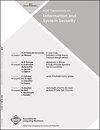工作流可满足性问题的参数化复杂度与核化
Q Engineering
ACM Transactions on Information and System Security
Pub Date : 2012-05-03
DOI:10.1145/2487222.2487226
引用次数: 49
摘要
工作流规范定义了一组步骤以及执行这些步骤的顺序。安全需求可能会对允许哪些用户组执行这些步骤的子集施加约束。如果存在满足所有约束的用户对工作流步骤的分配,则说工作流规范是可满足的。作为工作流规范的静态分析工具和工作流管理系统运行时参考监控器的构建,确定这样的分配是否存在的算法是很重要的。一般来说,找到这样的分配是一个难题,但Wang和Li[2010]使用参数化复杂性理论的研究表明,在对工作流规范的合理假设下,存在有效的算法。在本文中,我们改进了工作流可满足性问题的复杂度界限。我们还概括和扩展了可能在工作流规范中定义的约束类型,并证明了对于此类约束,可满足性问题仍然是固定参数可处理的。最后,我们考虑了问题的预处理,并证明了在一个重要的特殊情况下,在多项式时间内,我们可以将给定的输入减少到一个等价的输入,其中用户的数量最多是步数。我们还证明,对于这种情况的两种自然扩展不存在这样的减少,这两种扩展以步数的多项式限制用户数量,提供了一个广泛接受的复杂性理论假设。本文章由计算机程序翻译,如有差异,请以英文原文为准。
On the Parameterized Complexity and Kernelization of the Workflow Satisfiability Problem
A workflow specification defines a set of steps and the order in which these steps must be executed. Security requirements may impose constraints on which groups of users are permitted to perform subsets of these steps. A workflow specification is said to be satisfiable if there exists an assignment of users to workflow steps that satisfies all the constraints. An algorithm for determining whether such an assignment exists is important, both as a static analysis tool for workflow specifications and for the construction of runtime reference monitors for workflow management systems. Finding such an assignment is a hard problem in general, but work by Wang and Li [2010] using the theory of parameterized complexity suggests that efficient algorithms exist under reasonable assumptions about workflow specifications. In this article, we improve the complexity bounds for the workflow satisfiability problem. We also generalize and extend the types of constraints that may be defined in a workflow specification and prove that the satisfiability problem remains fixed-parameter tractable for such constraints. Finally, we consider preprocessing for the problem and prove that in an important special case, in polynomial time, we can reduce the given input into an equivalent one where the number of users is at most the number of steps. We also show that no such reduction exists for two natural extensions of this case, which bounds the number of users by a polynomial in the number of steps, provided a widely accepted complexity-theoretical assumption holds.
求助全文
通过发布文献求助,成功后即可免费获取论文全文。
去求助
来源期刊

ACM Transactions on Information and System Security
工程技术-计算机:信息系统
CiteScore
4.50
自引率
0.00%
发文量
0
审稿时长
3.3 months
期刊介绍:
ISSEC is a scholarly, scientific journal that publishes original research papers in all areas of information and system security, including technologies, systems, applications, and policies.
 求助内容:
求助内容: 应助结果提醒方式:
应助结果提醒方式:


